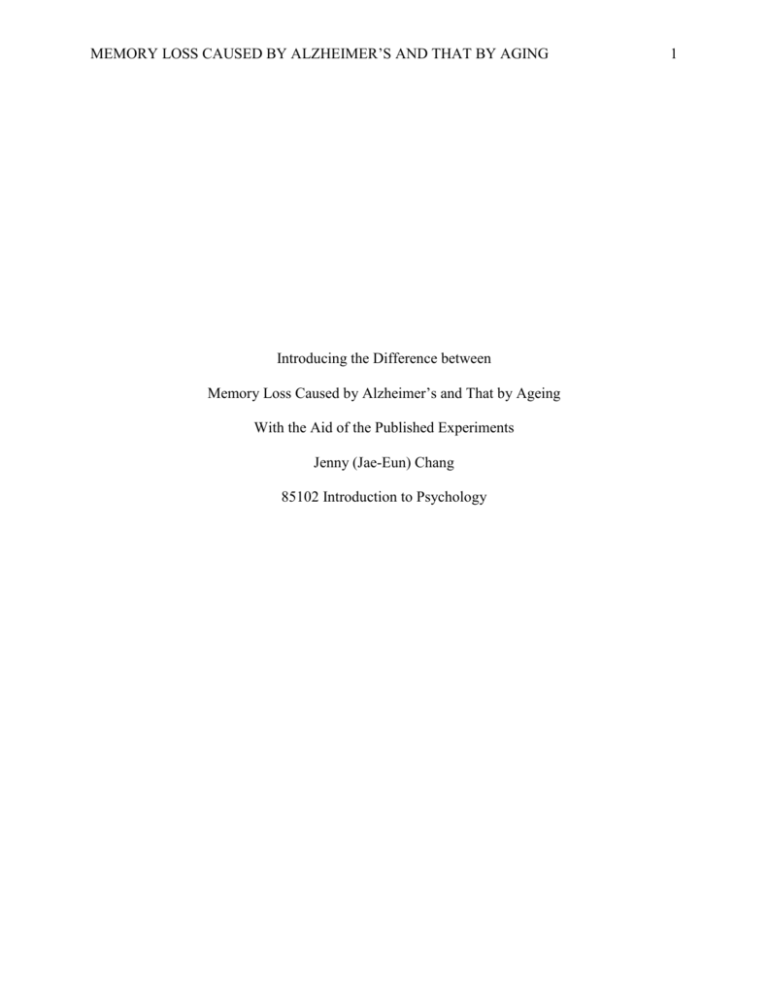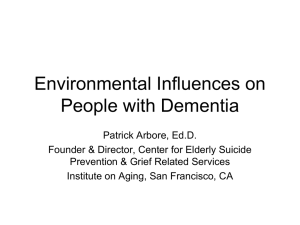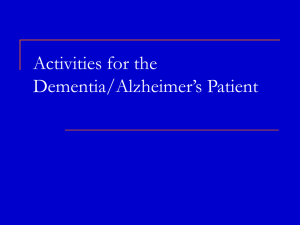Exam Steps
advertisement

MEMORY LOSS CAUSED BY ALZHEIMER’S AND THAT BY AGING Introducing the Difference between Memory Loss Caused by Alzheimer’s and That by Ageing With the Aid of the Published Experiments Jenny (Jae-Eun) Chang 85102 Introduction to Psychology 1 MEMORY LOSS CAUSED BY ALZHEIMER’S AND THAT BY AGING 2 Abstract The consequences of having Alzheimer’s disease are devastating. It is a brain degenerative disorder characterized by the loss of neurons and synapses and damages in brain areas which are responsible for cohesive cognition. However, in the beginning, it only appears as occasional mistakes humans are bound to make, such as minor and inconsequential forgetfulness. The dementia is also hard to detect because it is prominent among elderly and the symptoms are almost indistinguishable from the deteriorations caused by ageix n mhng to the uninformed majority. It is very likely to proceed to the uncontrollably severe stage unnoticed. One measure to prevent the symptoms from exasperating is to discover ways to make the disease more visible to the general public. Memory is something most people can test themselves. Taking this convenience into account, this paper explores the simple task of introducing the difference caused by ageing and that by the dementia found in various experiments to aid to the complex task of facilitating the battle against this disease. MEMORY LOSS CAUSED BY ALZHEIMER’S AND THAT BY AGING 3 The beginning of Alzheimer’s disease feels like healthy ageing. An inflicted patient shows signs of memory degeneration but laughs it off, claiming he must be getting old. Because the symptoms for the disease at a mild stage is similar to those unavoidable with aging, he overlooks the problem until accidents become frequent and when he, finally, finds his behavior strange he is already at a stage where his cognition and other controls of his mind are undergoing dreadful alterations. Alzheimer’s disease is a brain degenerative disorder characterized by anatomical changes such as neocortical atrophy, neuron and synapses loss, and damages in various parts of the brain including hippocampus and entorhinal cortex (Salmon, Butters, & Chan, 1999). The disease starts off very mildly resembling the normal symptoms of healthy aging in many ways. However, with increasing acuity, it deteriorates one’s mind so much that, instead of making worthwhile last memories, it retrogrades in memory and meets an unready end. It is important we learn the differences between healthy aging and Alzheimer’s so that, upon recognizing the disease early on, we take precautions to prevent further exacerbation. The most distinguishing symptom of the dementia is memory loss. Fortunately, memory is an easily detectable measure and, therefore, it is the best means of diagnosis besides professional advising. The experiments performed on this topic clear some of the misconceptions of the disease and discern more accurately the memory loss caused by the dementia from that by aging. The Wechester Memory Scale has conducted a great number of studies to show the detrimental role of Alzheimer’s in memory. The Logical Memory subtest of the Wechester Memory Scale remains so far the most extensive neuropsychological battery done to study whether semantic deficiency is the most noticeable symptom of Alzheimer’s. Arriagada, Growdon, Hedley-Whyte, and Hayman produced recent studies, suggesting that the hippocampus which is responsible for producing semantic memory is involved in the earliest MEMORY LOSS CAUSED BY ALZHEIMER’S AND THAT BY AGING 4 stages of the disease (as cited in Salmon, et al., 2002, p.108). Supportive of their view, Haut, Demarest, Keefover, and Rankin (as cited in Johnson, Storandt, & Baloa, 2002, p.82) claimed that although able to use correct grammar, Alzheimer patients lack coherent thought process necessary for articulating thematically ideas, a sign of semantic deficiency. Their study accurately presented what this deficiency meant. It was conducted carefully to eliminate any subjectivity and ambiguity in scoring. For prose recall, texts were divided into propositions, the smallest phrases or words that retain meaning relevant to the concepts present in the text as a whole. Questions referred to central concepts and arguments, asking who and details on the actors or actions, respectively. The goal was to determine if the subject grasped the thematic concept, to test the participant’s semantic memory ability. Full score was given when the answer contained veridical report establishing some relationships, not necessarily the exact replica of the original text. Some points were allowed for gist production, reproducing the text’s intended meaning but no veridical report, and distortion of the text. The subjects of the study were blocked into four groups: adults who are young, healthy old, with no dementia, very mild dementia, and mild dementia. The three older groups had only slight age variation, all of their age centered at about early seventy. The participants were asked to recall twice: immediately and thirty minutes after hearing. They were not informed about the second testing and were carefully monitored to reduce the effect of interference as much as possible (Johnson, et al., 2002). The result for the immediate recall is astounding. Although our experience or common sense says otherwise, there was no significant difference between the ages for the veridical response. Semantic memory, an ability to memorize through association with meaning and concept, does not diminish with increasing age when used for short-term. Morris suggests that many researches done in the past may have produced wrong results that attributed immediate MEMORY LOSS CAUSED BY ALZHEIMER’S AND THAT BY AGING 5 memory loss to ageing because they have failed to screen their older subjects for dementia and, therefore, failing to account for the effect of dementia (Johns, et al., 2002). The only influence the increase in age had in the immediate questioning was that it reduced the number of distortion (Johns, et al., 2002). This prominence of distortion for the young generation, although not mentioned in the WMS Logical Memory, is due to false recall, possibly caused by ample neurological synapses promoting learning and forming new associations. In a delayed retrieval, however, age has a significantly more noticeable effect. Older participants proved to have much more difficulty retaining veridical representations than young adults. Breakdown in retention in the long run and the immediate memory loss of dementia are often mistaken for one another. The effect of dementia is evident in recalling gist and veridical responses. The more severe the dementia the smaller the number of veridical and gist recalls were. Although the gist response also decreased by a noteworthy amount the immediate decrement in veridical response is significant enough to be the most distinguishable feature of the dementia in immediate recall. The effect of dementia after delay is only a little different from that of before. The number of gist recall and distortion remained low. Johnson (as cited in Johnson, et al., 2002, p.89) concludes that the error committed by the demented participants is from omission rather than commission. Moreover, upon further analysis, it is found that under gist error central association was remembered a great deal more than arguments. This raises another possibility that although semantic deficiency was responsible for the dramatic decrease in veridical response their ability to make associations prove that the semantic priming is not completely absent; there may be another mechanism underlying the memory loss (Johnson, et al., 2002). MEMORY LOSS CAUSED BY ALZHEIMER’S AND THAT BY AGING 6 Baddeley (as cited in Johnson, et al., 2002) proposed another explanation for memory loss in demented participants with the introduction of episodic buffer which is a temporary storage system controlled by the central executive, which does not have storage capacity but governs attention control. He argues that the fact that recent memory, intact comprehension, retention, and other integration elements remain during the early stages of the dementia serves as a proof that semantic priming, or forming relationships for the incoming information based on what they already know, are not lost but, relatively active and, lack of attention, instead, should be blamed for forgetting (as cited in Johnson, et al., 2002). Moreover, the false recall test challenges the claim that early phases of Alzheimer’s disease are marked by semantic memory loss. False recall should only be expected from the people who are able to encode and retrieve misinformation, or false but related information, which can only be made through establishing some connections among inputs. Therefore, should Alzheimer patients lack semantic priming, which allows recognizing conceptual relationships, they will not be able to retrieve misinformation. The result was revolutionary. Alzheimer patients successfully produced misinformation; they were told to study lists of related words such as “thread, pin, and eye”. Then, when ordered to recall, they were able to retrieve non-presented items that were related to the list, such as “needle”. Watson, Balota, and Sergent-Marshall noted that this ability to contrive false but related information was consistent throughout different age groups and multiple levels of dementia severity even though veridical recall still declined among them (as cited in Marsh, et al., 2005, p.116). As Balota and Dutcheck claimed, this regularity is not possible unless the individuals at the early stages of the dementia preserve semantic priming and some other semantic associating processes that are inaccessible via explicit retrieval but available through other means(as cited in Marsh, et al., 2005, p. 116). MEMORY LOSS CAUSED BY ALZHEIMER’S AND THAT BY AGING 7 As an additional evidence to the strength of the semantic activation, Budson, Daffner, Desikan, Schacter, and Sitarski demonstrated that the demented individuals were unable to reduce an illusion made by false connections even with episodic information, repeated study trials, and picture presentation of associates (as cited in Marsh, et al., 2005, p.116). This proves how strong the relationships were established and since their semantic priming seems to be firmer than their memory retention the associations made were hard to break by exposing them other memories. Interestingly, this aspect of the dementia is similar to the symptoms of healthy aging. Older adults were exposed to an original event and then also misled about it (Marsh, et al., 2005, p. 115). The result showed that they were much more prone to reproducing misinformation after they were corrected than young adults. They also showed signs of impaired episodic memory in tests to recall the scenes of the movie they just watched (Marsh, et al., 2005). Here, we learn what we know to be a slight difference between the healthy old men and the mildly demented actually subtler. However, the difference exists – although they both intact semantic priming and make inflexible connections among related subjects, the demented patients are inexplicit, drastically lacking in veridical articulation for the connected they established in their heads, and, therefore, in complicated tasks such as explaining thematic ideas they appear as if they could not catch any main point. Furthermore, the experiment advanced into a different study in order to investigate whether reading about a story with lies and truths would lead them to use the information they gathered from the reading when they are tested later on general knowledge. The same study was provided to both groups of interest. Learning false or facts they did not know about required them to form new associations. The Alzheimer patients recalled thirty minutes later forty percent of the information and the old adults remembered eighty-one percent even after an hour (Marsh, MEMORY LOSS CAUSED BY ALZHEIMER’S AND THAT BY AGING 8 et al., 2005). When the test was divided into easy and difficult levels, for healthy elders, misinformation reduced their correctness for easy questions while the reading had no affect on them for the neutral baseline. For the demented patients, however, there was not much change caused by the reading. This difference is caused by the healthy men’s better ability to make entirely new associations arisen completely independent of the knowledge they previously held, and, the demented individuals’ lack of them. For some easy questions, the patients did much better than they did for hard ones. Marsh (2005) claimed that this was caused by their familiarity with the easy questions. She (2005) also suggested it could have been because of their need for longer retrieval times. However, even if she is right it proves the ability to form entirely new connections is much harder for dementia patients than healthy elders. Without analysis it is almost impossible to notice the difference in memory loss caused by healthy aging and Alzheimer’s disease. The difference is small but distinguishable enough to be a criterion for diagnosis. Short-term memory loss in veridical recall has to be dramatic. The patient’s recalling misinformation proves that semantic priming is still retained at the early stages of dementia, allowing making connections possible. Although the ability to create association exists in both groups it is much harder for the demented patients to form associations based on completely new ideas. Horrible illnesses like Alzheimer’s feel far away. Even though as we age we show symptoms similar to the Alzheimer’s the thought of being diagnosed with it sounds so mythical it never crosses our minds. However, it is a prominent disease killing growing number of lives. Instead of taking comfort in the benefit of the doubt, one must tighten the loose assumptions and really seek to fight the dangers of the dementia from the beginning. MEMORY LOSS CAUSED BY ALZHEIMER’S AND THAT BY AGING References Johnson, D. K., Storandt, M., & Balota, D. A. (2003). Discourse analysis of logical memory recall in normal aging and in dementia of the Alzheimer type. Neuropsychology. 17(1), 82-92. Marsh, E. J., Balota, D. A., & Roediger, H. L., III. (2005). Learning Facts From Fiction: Effects of Healthy Aging and Early-Stage Dementia of the Alzheimer Type. Neuropsychology. 19(1), 115-129. Salmon, D. P., Butters, N., & Chan, A. S. (1999). The deterioration of semantic memory in Alzheimer's disease. Canadian Journal of Experimental Psychology/Revue Canadienne De Psychologie Exp?Erimentale. 53(1), 108-116. 9








